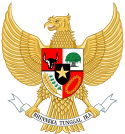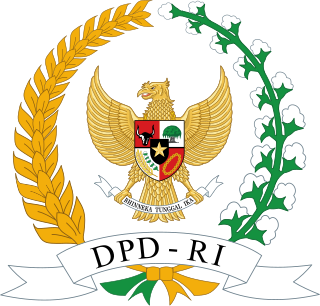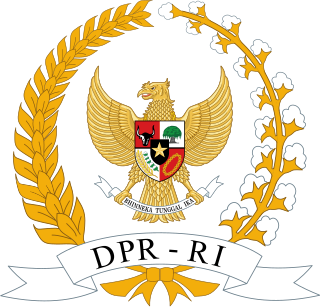
The politics of Indonesia take place in the framework of a presidential representative democratic republic whereby the President of Indonesia is both head of state and head of government and of a multi-party system. Executive power is exercised by the government. Legislative power is vested in both the government and the two People's Representative Councils. The judiciary is independent of the executive and the legislature.

Indonesia held legislative elections on 5 April 2004 for both houses of the People's Consultative Assembly, the country's national legislature. This included all 550 seats in the People's Representative Council and 128 seats of the new Regional Representative Council.

Elections in Indonesia have taken place since 1955 to elect a legislature. At a national level, Indonesian people did not elect a head of state – the president – until 2004. Since then, the president is elected for a five-year term, as are the 560-member People's Representative Council and the 128-seat Regional Representative Council.

The Democratic Party is a centre to centre-right political party in Indonesia. It was founded on 9 September 2001. Its ideology is based on the Indonesian concept of Pancasila, and identifies as centrist.

The National Mandate Party, frequently abbreviated to PAN, is an Islam-based political party in Indonesia.

The Crescent Star Party is a political party in Indonesia.
The Concern for the Nation Functional Party is a political party in Indonesia. The party was established by former members of the Golkar Party who were dissatisfied with Golkar's abandonment of former president Suharto including former minister Hartono and Suharto's daughter Siti Hardiyanti Rukmana. Suharto himself approved the party name.
The Indonesian Justice and Unity Party is a political party in Indonesia.

The 1999 Indonesian legislative election, held on 7 June 1999, was the first election since the end of the New Order and the first free election in Indonesia since 1955. With the ending of restrictions on political activity following the fall of Suharto, a total of 48 parties contested the 462 seats up for election in the People's Representative Council. A further 38 seats were reserved for the armed forces.

Legislative elections were held in Indonesia on 9 April 2009 for 132 seats of the Regional Representative Council (DPD) and 560 seats of the People's Representative Council (DPR). A total of 38 parties met the requirements to be allowed to participate in the national elections, with a further six contesting in Aceh only. The Democratic Party of President Susilo Bambang Yudhoyono won the largest share of the vote, followed by the Golkar Party and the Indonesian Democratic Party – Struggle.
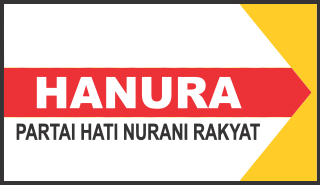
The People's Conscience Party is a political party in Indonesia. It was established following a meeting in Jakarta on 13–14 December 2006 and first headed by former Indonesian National Armed Forces commander Wiranto.
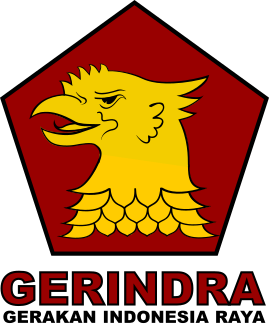
The Great Indonesia Movement Party is a political party in Indonesia. In the 2014 presidential election, the party was represented by former Indonesian Army Strategic Reserve Command and Indonesian special forces commander Lieutenant General Prabowo Subianto. Prabowo lost to Joko Widodo in the election, earning 46.85% of the vote to Widodo's 53.15%.
The Indonesian Nahdlatul Community Party is the Minor Conservative political party in Indonesia.
The Labour Party is a political party in Indonesia. It has its origins in the Indonesian Prosperous Laborers organization (SBSI), which in 1993 threw its support behind the Indonesian Democratic Party (PDI) as a vehicle for its political aspirations. When the PDI split in 1996, it allied itself with the breakaway faction led by Megawati Sukarnoputri, which led to it coming under pressure from the New Order government of President Suharto. On 30 July 1996, SBSI chairman Muchtar Pakpahan was detained on subversion charges. Following the fall of Suharto in 1998, the SBSI became disillusions with Megawati's now renamed Indonesian Democratic Party – Struggle and decided to establish its own party, the National Labour Party. After the failure in 1999 election, the party changed its name to Social Democrat Labour Party. The party stood in the 2004 Indonesian legislative election, but won only 0.6 percent of the vote and no legislative seats. Party chairman However, the party has 12 representatives in provincial assemblies. The party subsequently changed its name to the Labour Party.

Presidential elections were held in Indonesia on 9 July 2014, with former general Prabowo Subianto contesting the elections against the governor of Jakarta, Joko Widodo; incumbent president Susilo Bambang Yudhoyono was constitutionally barred from seeking a third term in office. On 22 July the General Elections Commission announced Joko Widodo's victory. He and his vice president, Jusuf Kalla, were sworn-in on 20 October 2014, for a 5-year term.
A general election was held on 9 April 2014 in Indonesia to renew the mandate of the national and regional legislatures which will expire this year. Official results were announced on 9 May 2014, with the DPR seat allocation being announced separately on 14 May. This is the fourth free and democratic legislative election since the Fall of Suharto in 1998.

General elections will be held in Indonesia on 17 April 2019. For the first time in Indonesian history, the president, the vice president, and members of the People's Consultative Assembly (MPR), will be elected on the same day with over 190 million eligible voters. Sixteen parties will be participating in the elections nationally - with four participating for the first time.

The Berkarya Party is an Indonesian political party formed in 2016. The party is led by the youngest son of former president and dictator Suharto, Hutomo Mandala Putra. Better known as Tommy Suharto, he is a convicted murderer by proxy. Berkarya is one of 16 political parties eligible to contest Indonesia's 2019 general election. The party is supporting Tommy's former brother-in-law Prabowo Subianto for the presidency in 2019.
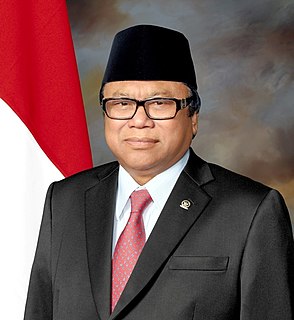
Oesman Sapta Odang is an Indonesian politician of the People's Conscience Party (Hanura), serving as the speaker of the Regional Representative Council and deputy speaker of the People's Consultative Assembly. He had also served in the latter position between 2002 and 2004.

The Indonesian electoral law of 2017, also known in Indonesia as Undang-Undang Pemilu, is the law regulating elections in Indonesia. Officially, it is known as the Law Number 7 of 2017. The law was passed in July 2017 following nine months of debate in the People's Representative Council.
